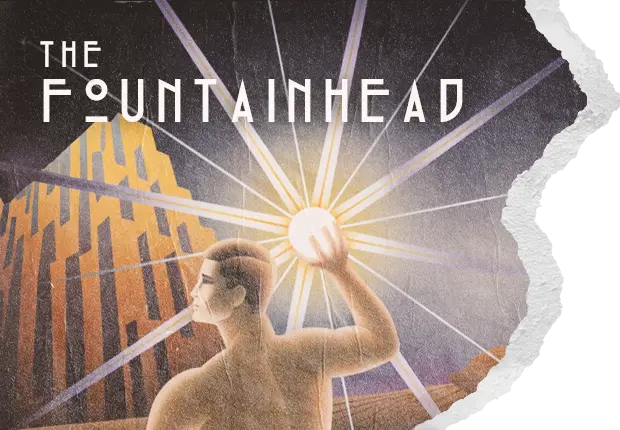The Fountainhead
“If you learn how to rule one single man’s soul, you can get the rest of mankind. It’s the soul . . . Not whips or swords or fire or guns. That’s why the Caesars, the Attilas, the Napoleons were fools and did not last. We will. The soul . . . is that which can’t be ruled. It must be broken. Drive a wedge in, get your fingers on it—and the man is yours. You won’t need a whip—he’ll bring it to you and ask to be whipped. Set him in reverse—and his own mechanism will do your work for you. Use him against himself. Want to know how it’s done?… There are many ways.”
That’s Ellsworth Toohey, the socialist villain of Ayn Rand’s 1943 novel, The Fountainhead, speaking, in his long monologue at the end of the book.
Our country is full of people asking the government to whip them. In 2018, millions participated in March for Our Lives, calling on the state to take away their Second Amendment rights. In 2020 and 2021, every time a COVID restriction was lifted, there were people demanding it be reimplemented, desperate to stay confined to their house arrests. When Trump’s tax returns were released in 2022, Etsy sellers made bumper stickers that said, “I paid more income taxes than Trump,” for proud government paypigs to stick on the back of their salvage-title Priuses. These are people who get off on getting down on their knees and begging the regime to regulate them harder. We are surrounded by ruled souls.
“Here’s one,” Toohey says, introducing the first of many ways to use a man against himself.
“Make man feel small. Make him feel guilty. Kill his aspiration and his integrity. That’s difficult. The worst among you gropes for an ideal in his own twisted way. Kill integrity by internal corruption. Use it against itself. Direct it toward a goal destructive of all integrity. Preach selflessness. Tell man that he must live for others. Tell men that altruism is the ideal. Not a single one of them has ever achieved it and not a single one ever will. His every living instinct screams against it. But don’t you see what you accomplish? Man realizes that he’s incapable of what he’s accepted as the noblest virtue—and it gives him a sense of guilt, of sin, of his own basic unworthiness. Since the supreme ideal is beyond his grasp, he gives up eventually all ideals, all aspiration, all sense of personal value… You’ve got him. He’ll obey. He’ll be glad to obey—because he can’t trust himself, he feels uncertain, he feels unclean. That’s one way.”
In 2020, several girls I knew reposted the same Instagram story. In rainbow letters, it said, “Vote as if your skin is not white, your parents need medical care, your friend is a missing indigenous woman, your spouse is an immigrant, your son is transgender, your daughter is a sexual assault survivor, your sister is a victim of gun violence, your brother is gay.” Why would I do that? I thought. None of these statements apply to me, and I see no reason to pretend they do. Their answer to my question was at the bottom of the post, “Because privilege has no place in an election, but empathy does.” That line does not work on me. I will never take being called “privileged” as anything but a compliment. If empathy is the ability to put yourself in someone else’s shoes, I have no interest in putting myself in their ugly clearance-rack footwear. Moreover, the empathy they reference only goes one way. They want me to act in the self-interest of people who would never act in my self-interest. I don’t expect or ask anyone to act in my self-interest because I don’t accept selflessness as a virtue. I value superiority, success, and self-sufficiency, all of which are inherently incompatible with selflessness. Toohey is correct that the man who can’t trust himself will be glad to obey. “I trust the experts,” became the midwit motto in 2020 and is still held by far too many people today. The so-called experts—in science, in politics, in media—are idiots. Anyone who trusts them more than he trusts himself is even more of an idiot than they are. But as long as you hold onto your ideals, your aspiration, and your sense of personal value, they won’t get a hold of you.
“Here’s another,” Toohey says.
“Kill man’s sense of values. Kill his capacity to recognize greatness or to achieve it. Great men can’t be ruled. We don’t want any great men. Don’t deny the conception of greatness. Destroy it from within. The great is rare, the difficult, the exceptional. Set up standards of achievement open to all, to the least, to the most inept—and you stop the impetus to effort in all men, great or small. . . . Don’t set out to raze all shrines—you’ll frighten men. Enshrine mediocrity—and the shrines are razed.”
Our society hasn’t just killed man’s capacity to recognize greatness or to achieve it—they have given life to man’s capacity to demonize greatness and to destroy it. This is how we get brain-dead college students tearing down statues of American heroes, ugly climate activists vandalizing beautiful paintings, and overweight welfare recipients screaming to eat the rich. Our government hasn’t just set up the standards of achievement open to all, including the least and the most inept—in many cases, they have exclusively restricted the standards of achievement to the least and the most inept. They have gone beyond enshrining mediocrity—they are now deliberately elevating inferiority. Even though we have to live with their low standards, we don’t have to hold ourselves to them. I want to exist at my highest potential levels of beauty, knowledge, and morality because I love the rare, the difficult, the exceptional. My best advice here is to make yourself into one shrine they can’t raze.
“Here’s another way,” Toohey says:
“This is most important. Don’t allow men to be happy. Happiness is self-contained and self-sufficient. Happy men have no time and no use for you. Happy men are free men. So kill their joy in living. Take away from them whatever is dear or important to them. Never let them have what they want. Make them feel that the mere fact of a personal desire is evil. Bring them to a state where saying ‘I want’ is no longer a natural right, but a shameful admission. Altruism is of great help in this. Unhappy men will come to you. They’ll need you. They’ll come for consolation, for support, for escape. Nature allows no vacuum. Empty man’s soul—and the space is yours to fill.”
COVID restrictions were a global effort to kill people’s joy in living, done under the altruistic guise of keeping people alive. The “experts” in science, politics, and media characterized personal desires to work, to exercise, to socialize as evil. They tried to take away the right to say what you want and replace it with the requirement to care what others need. They expected you to sacrifice your wealth by not working for the sake of the disadvantaged, your health by not exercising for the sake of the immunocompromised, and sacrifice your youth by not socializing for the sake of the elderly. Just as the government made it their goal to never let you have what you want, you should have made it your goal to never let them have what they want. This meant not staying home, not wearing the mask, not getting the vaccine—and ultimately, not letting them empty your soul. Throughout COVID, I still worked, I still exercised, I still socialized. Their reason for taking happiness—because it is self-contained and self-sufficient—is also the reason they weren’t able to take mine.
“Men have a weapon against you. Reason. So you must be very sure to take it away from them. Cut the props from under it,” Toohey says.
“But be careful. Don’t deny outright. Never deny anything outright, you give your hand away. Don’t say reason is evil—though some have gone that far and with astonishing success. Just say that reason is limited. That there’s something above it. What? You don’t have to be too clear about it either. The field’s inexhaustible. ‘Instinct’ —‘Feeling’—‘Revelation’—‘Divine Intuition’—‘Dialectic Materialism.’ If you get caught at some crucial point and somebody tells you that your doctrine doesn’t make sense—you’re ready for him. You tell him that there’s something above sense. That here he must not try to think, he must feel. He must believe. Suspend reason and you play it deuces wild. Anything goes in any manner you wish whenever you need it. You’ve got him.”
Our lexicon has expanded to include various ideologies that hinge on the suspension of reason—from earlier additions such as communism and feminism, to more recent ones like anti-racism and transgenderism. Doctrines like this don’t make sense because they attempt to enforce equality between the unequal. The people who buy into them pay a price. Just because they ignore reality doesn’t mean reality ignores them. A believer in body-positivity may feel that being morbidly obese is beautiful and healthy but that doesn’t change how unattractive men find her or how likely she is to die prematurely. They’re irrational people terminally forced to live under the rational laws of nature. We’re rational people occasionally forced to live under the irrational laws of men. Know the difference.
“Everything I said is contained in a single word—collectivism. And isn’t that the god of our century? To act together. To think—together. To feel—together. To unite, to agree, to obey. To obey, to serve, to sacrifice. Divide and conquer—first. But then—unite and rule. We’ve discovered that one at last,” Toohey concludes. “Remember the Roman Emperor who said he wished humanity had a single neck so he could cut it? People have laughed at him for centuries. But we’ll have the last laugh. We’ve accomplished what he couldn’t accomplish. We’ve taught men to unite. This makes one neck ready for one leash.”
I understand the temptation to say that Ellsworth Toohey’s world of the future is already here. We may be closer to it than we’ve ever been, but we’re not there yet—and as long as you choose to live for yourself, as long as you refuse to be subjugated to the will of all, we never will be. To unite with stupid people who hate you is suicidal. Don’t let yourself become a part of that one neck ready for one leash.

































